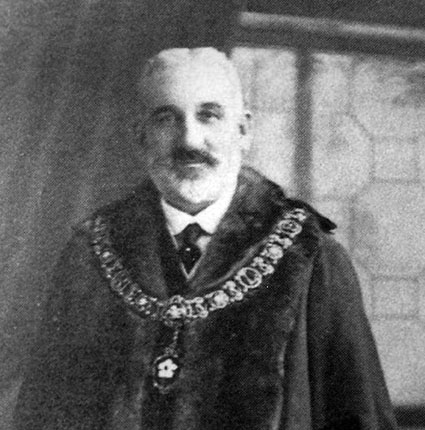
William Harrison (1838-1908)
WILLIAM Brewster Harrison was truly a man whose heart was in the town he loved.
As well as being a successful businessman, whose osier (willow) factories produced top quality goods, he took a very active role in town affairs.
His roots are very unclear. Although it is generally assumed he was the son of basketmaker Samuel Harrison, and census records put him down as born in 1838, there is no record of his birth.
Even when he married Sarah Willcock in 1862, the father’s name was left blank and no Harrisons were among the list of witnesses. Yet when Samuel died five years later, William took over the Watergate basketmaking business.
At the offset, he employed two men and two boys but it grew to more than 200.
The range of goods was extended to other wicker products, made from the willows grown between the Grantham Canal and the Mowbeck and or marshy ground between Dysart Road and Barrowby Road.
He turned his attention to prams, wicker furniture and invalid carriages.
The prams, which originally cost 4/- (20p) were marketed under the Belvoir marque and eventually became the Rolls Royce of baby carriages.
By the 1930s they sold at £30 each – five times the wage of an average worker.
The highest selling point of the luxury prams, made at the Wharf Road factory (Tanvic site) formerly Boyall’s carriage works, was the specially tempered springing.
Perhaps the most profitable side of the business was Government contracts. The company supplied wicker baskets for both parcel post and to the War Office for carrying shells.
Although a highly respected employer, in winter the ice had to be broken on his garden pond to soak the osiers, while many employees were scalded in the open vats of boiling water used to soften the willow.
Yet despite the demands of his business, he was also keen to perform his public duty.
He was elected to the Borough Council in 1886, became Mayor and Chief Magistrate in 1894-5 and an alderman in 1903.
He was also a member of Kesteven County Council and although a staunch Conservative, did not get involved in politics.
He was keen on education and fought to maintain the Technical Institute (which evolved into Grantham College and the Boys’ Central School).
He was also a governor at the King’s School and Sedgebrook School and manager of the Grantham National Schools.
In 1907 he was struck by a flu bug which left him very weak. He went to Harrogate and Torquay and appeared to make a full recovery by autumn, but four months later he fell into a coma and died.
All that remains of his empire are the canalside Willows and the packing shop in Union Street which is now occupied by contemporary furnishers, Union.
The Watergate shop, gardens and workshops were demolished in 1967 to make way for Key Markets superstore.




Leave a Reply
You must be logged in to post a comment.